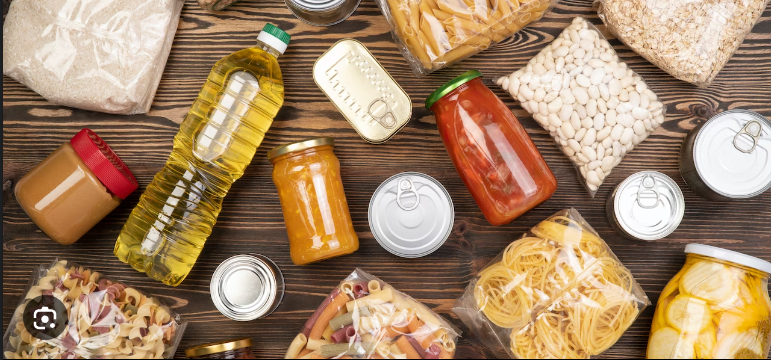There are processed foods in every place—restaurants, grocery stores, and our homes. But what exactly is processed food? We describe them and the reasons you ought to be aware of them.
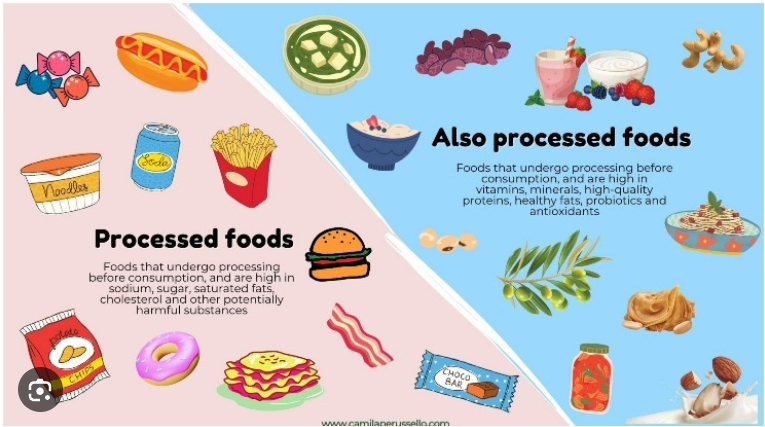
Also read-The Incredible Benefits Of Ghee For Skin And Health
These days, processed foods are the talk of the town when it comes to dietary devils. It is believed that eating processed foods increases one’s risk of acquiring cancer, type 2 diabetes, obesity, heart disease, and a host of other harmful health impacts. But is this reputation for villainy truly warranted? There is no official definition of processed foods, which makes the problem more complex than it first appears. They range from moderately processed foods like yogurt or canned peaches to highly processed foods like packaged baked goods, hot dogs, and salty chips.
What are Processed Foods?

Any food that has been cooked, canned, frozen, preserved, packed, or fortified with healthy nutrients is considered processed. In actuality, processed foods are defined as anything that has been blended, pureed, juiced, dried, chopped, diced, sliced, pitted, or crushed, according to the U.S. Department of Agriculture. As a result, processed foods also include whole-wheat bread, canned beans, a carton of pasteurized milk, and jars of tomato sauce, in addition to frozen mac and cheese or pizza, bags of BBQ chips, and cheeseburgers from fast food restaurants.
“Everything is processed unless you go into a corn field or to an apple tree and bite into that food right off the stalk,” says Keith Ayoob, a registered dietitian and associate professor emeritus of pediatrics at the Albert Einstein College of Medicine in New York. “Processing isn’t all bad. You can have processed food that’s whole food.” “A bag of roasted peanuts is considered processed, but it’s fine,” says Abby Greenspun, a registered dietitian who specializes in disease prevention and weight management in Westport, Connecticut. “By contrast, honey-coated, chocolate-dipped peanuts obviously are more processed and worse for you.”
Types of Processed Foods
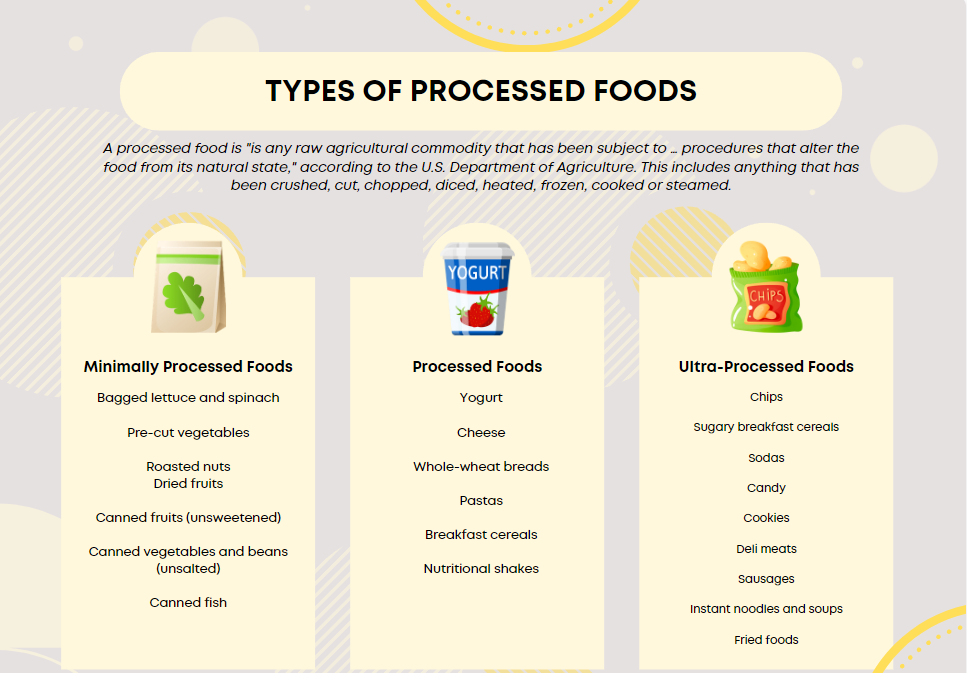
Minimally processed foods
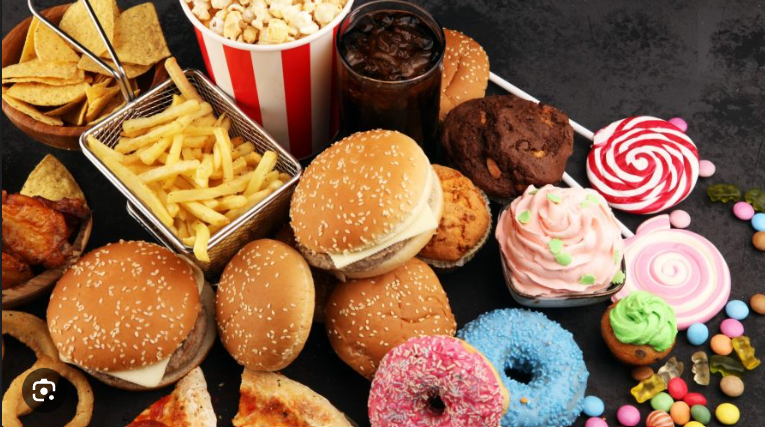
To preserve nutritional value, several of these items are processed when their freshness is at its highest. As Ayoob notes, tomatoes that have been boiled or processed before canning have a higher level of the antioxidant lycopene accessible to the body than fresh tomatoes.
Foods with minimal processing include:
- Bagged lettuce and spinach.
- Pre-cut vegetables.
- Roasted nuts.
- Dried fruits.
- Canned, unsweetened fruits, and unsalted vegetables and beans
Some minimally processed foods, such as the ones listed above, make good-quality, nutritious foods convenient for busy people to use.
Why are processed foods bad?

Eating a lot of highly processed food can raise your chance of getting long-term health issues. Ultra-processed foods, in particular, have high levels of sugar, salt, oil, calories, and preservatives. There are numerous more substances there that have no nutritional benefit. “You should reduce the amount of empty calories in your diet that come from baked goods, sweets, and high-sugar beverages, but not too many other sources,” advises Ayoob.
Ultra-processed food consumption has been linked to an increased risk of heart disease, Type 2 diabetes, obesity, and hypertension, making it particularly detrimental to human health. Studies have indicated a connection between an increased intake of highly processed foods and a higher risk of obesity, metabolic syndrome, and cardiovascular disease.
In a study published in the 2019 issue of Cell Metabolism, researchers discovered that individuals who are slightly overweight gained weight and consumed about 500 more calories per day when they adhered to an ultra-processed diet for two weeks as opposed to sticking to an unprocessed diet. The effects start to manifest right away. The researchers came to the conclusion that cutting back on highly processed foods would be a useful tactic for treating and preventing obesity.
Putting on weight doesn’t eliminate the risk of injury. According to a study published in the JAMA Neurology journal in 2023, persons who consume more ultra-processed foods on a regular basis experience a quicker rate of cognitive impairment over time. Additionally, a study published in the BMJ in 2022 discovered that males who consume a lot of ultra-processed foods are more likely to have colon cancer, which is the third most frequent cancer in the United States among both men and women.
How to Avoid Processed Foods
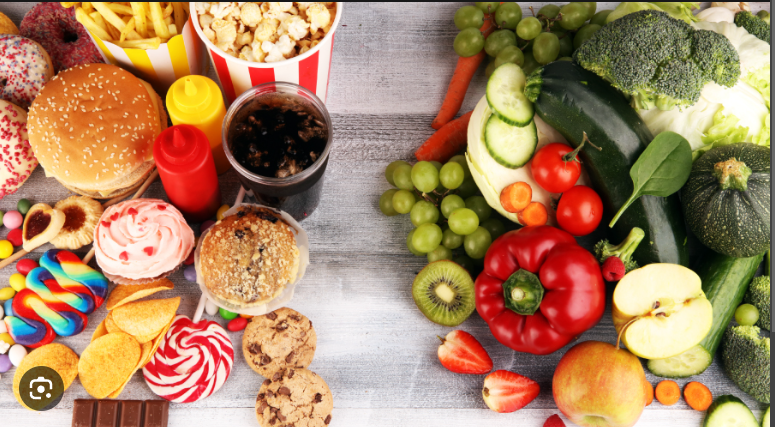
Replacing your processed food consumption with home cooking is one approach to do so. This entails utilizing whole foods, such as fruits, vegetables, whole grains, seafood, legumes, and other nutrient-dense meals.
The following are some methods to stay away from processed foods:
- Hydrate with water. Sugary bottled beverages – such as soda, sweetened tea and fruit juice – are notorious for being loaded with empty calories. Instead, quench your thirst with water. If you miss the carbonation from sodas, sparkling water is a great alternative. For a caffeine fix, brew your own tea and/or coffee at home, but skip the sugar and creamer.
- Make shrewd dietary choices. You can swap out highly processed foods for more healthful options. For instance, if you’re in the mood for something crunchy, try some slices of bell pepper or prepare some kale chips by lightly salting the leaves and baking them in the oven or air fryer. If you’re craving something sweet, consider freezing ripe bananas and blending them to create a homemade, healthful soft serve. By using these substitutions, you’ll sneak more fruits and vegetables into your diet while also satisfying your appetites.
- Meal preparation. If you’re too busy to cook, make a plan and prepare your meals for the week at home to avoid succumbing to the convenience of fast food. Many meal delivery services are available to assist remove the uncertainty by providing all the pre-portioned items you need to prepare homemade meals, directly to your door.
- Remove yourself from the deli counter. Cold cuts, sausages, and other processed meats are abundant in the deli meats area. Instead, load up your cart with protein from the meat and fish section of your local grocery store. Here, you’ll find shrewd substitutes like chicken, beef, salmon, and shrimp. Try tempeh, tofu, and chickpeas for plant-based protein sources.
Can You Still Eat Processed Foods?
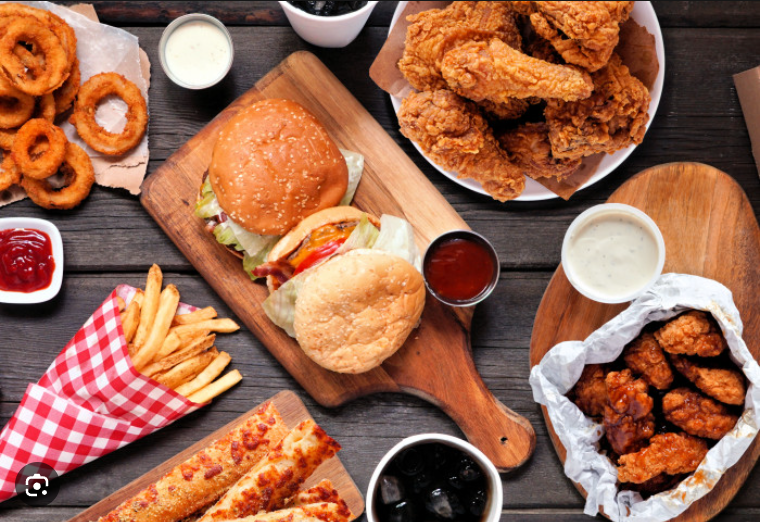
It is a fact that avoiding processed meals might be challenging. In actuality, these kinds of food are spreading more widely. According to a study published in the American Journal of Clinical Nutrition in 2022, adult consumption of processed foods—particularly ultra-processed foods—increased steadily in the United States between 2001 and 2018. Additionally, according to study published in BMJ Open, 58% of the calories consumed in the United States come from ultra-processed foods.
Bottom Line
According to Ayoob, the ultimate objective is to make more thoughtful choices about processed food consumption rather than to condemn or outright outlaw them. As much as possible, eat less processed foods; but, keep in mind that, if it’s what you really desire, there’s nothing wrong with occasionally indulging in chips or cookies. Ayoob continues, “It’s about how you incorporate it as part of a healthy, balanced diet.”
Also read-Worst Foods To Eat Before Bedtime
Images source -google







